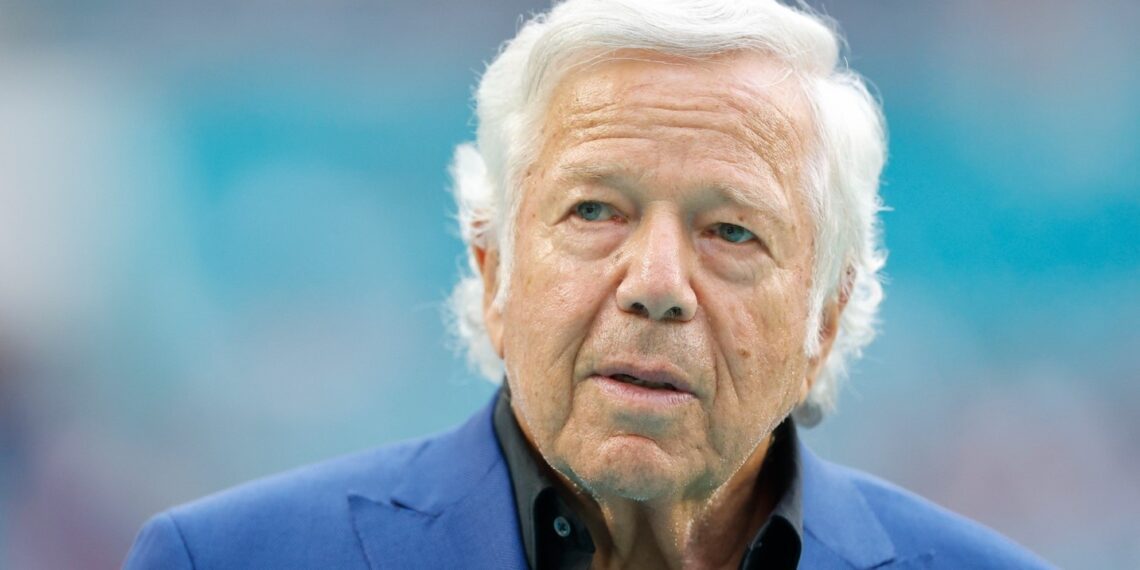The name Robert Kraft is well-known in both the business and sports world. This American businessman is the CEO of the Kraft Group, a diversified holding company with assets in everything from entertainment to real estate development.
Kraft is probably best known, though, as the New England Patriots owner, a team that has seen the playoffs 22 times under his watchful eye. They won 19 AFC East titles, including 11 consecutively, and ten conference championships. The Patriots have won the Super Bowl six times since being owned by Kraft.
They call Robert Kraft “The Connector” because he has built relationships throughout his life that have made him the success he is today.
Table of Contents
The Beginning of the Kraft Empire
Born in 1971 to Sarah Bryna and Harry Kraft, Robert grew up in Brookline, Massachusetts. His business career got an early start as he sold newspapers outside Braves Field in Boston.
Kraft graduated from Columbia University in 1963, the same year he married his wife of over 40 years, Myra Hiatt. He went on to get his MBA from Harvard Business School. Then, at age 27, he became the elected chair of the Newton Democratic City Committee.
His business roots began at Rand-Whitney Group, a packaging company out of Worcester. In 1968, he took ownership of the company. One thing became clear early on, Robert Kraft had a love for sports. He had played both tennis and football in college and, as a businessman, looked to turn that love into investments.
Robert Kraft: Sports Pioneer
“Robert is one of the sports’ great pioneers. Kraft’s a savvy negotiator who understands how to create mutual value for the NFL’s partners, including Disney, while always advocating for the game’s future, its players, and fans. And his philanthropic impact has been immeasurable and wide-ranging.” Bob Chapek, Disney CEO
Kraft’s first adventure in the world of sports was in 1974 when he led a team of investors to purchase the Boston Lobsters of World Team Tennis. His ambitions didn’t start there, though.
Kraft was considering purchasing a local team long before buying the Lobsters: the New England Patriots. Kraft was a season ticket holder and a big fan of the football franchise.
The team was floundering at the time under the ownership of the Sullivan family. The family also owned the Foxboro Stadium. In the 1980s, Billy Sullivan and his family were floundering financially due to bad investments. In 1988, the stadium went into bankruptcy. Kraft bought the stadium for 22 million, including a profitable lease to the Patriots, locked in place until 2001.
There were attempts to move the football team to other venues, but Kraft refused to budge. His initial bid to buy the team failed. Team ownership went to Victor Kiam in 1988 and James Orthwein in 1992. During this time, Kraft held on to the lease, refusing to let the team relocate. That gave him leverage when Orthwein decided to sell. Even though Kraft believed he was overpaying for the team, he acquired ownership for 172 million, the highest amount paid for any NFL team at the time.
The NFL and Broadcast TV
In December 1993, just weeks before Kraft’s official acquisition of the Patriots, Rupert Murdoch’s Fox Network stunned the world by paying $1.6 billion for a four-year agreement, edging out longstanding NFL rights holder CBS. Kraft’s power was cemented during those first negotiations for the team’s media rights package.
In four years, Robert Kraft took his place on the broadcast committee. He realized how desperately CBS desired to get back in and that the network’s desperation provided an opportunity for the NFL to make a hefty fee and alter the relationship in a meaningful way. CBS Sports Chairman Sean McManus was tasked with creating a case that went beyond the finances, providing the league a compelling reason to dump NBC, which owned AFC game rights at the time.
Kraft recognized that CBS and the NFL would need to agree on shoulder programming, production quality, marketing, and communication. CBS obtained the rights with an eight-year agreement costing $500 million per year, more than twice the yearly amount paid by NBC, who owned the rights at the time.
The Next Generation of NFL Game Broadcast Rights Is Digital
Many of the same folks were back at the table in 2020, attempting to work out the next generation of NFL rights deals. The figures alone made the 1990s deal feel antiquated. However, the advent of digital media had made the transactions significantly more complex, and the spreading COVID-19 epidemic had impeded even the most fundamental commercial interactions.
Outside analysts argued about who had the upper hand throughout the conversations. Because the numbers were so vast, the NFL was unable to build a surplus of bidders, which is normally a terrible omen. However, with scripted television viewership plummeting, Kraft and the NFL rightly calculated that the networks couldn’t exist without it.
Amazon, CBS, Disney, Fox, and NBC gave the NFL significant raises totaling $110 billion. The accords each had specific characteristics that matched each broadcaster’s streaming ambitions. As a result, they walked a fine line between the value of digital streaming and the relevance of traditional broadcast networks.
Kraft wowed then-NFL Commissioner Paul Tagliabue from the beginning.
“I think his legacy will be probably threefold: Success at the team level and success and major contributions at the league level, and thirdly, [doing it] over a period of years, which is going to be decades upon decades when he’s done. He was an innovator in business models, whether it was labor relations, television, stadium construction, fan service … he was a thoughtful innovator, and the innovations he contributed to have been sustainable for decades.”
The legacy of Robert Kraft, who turns 82 this year, is indeed in the relationships he built over his career. Those connections continue to impact people’s lives in business and sports worldwide.

